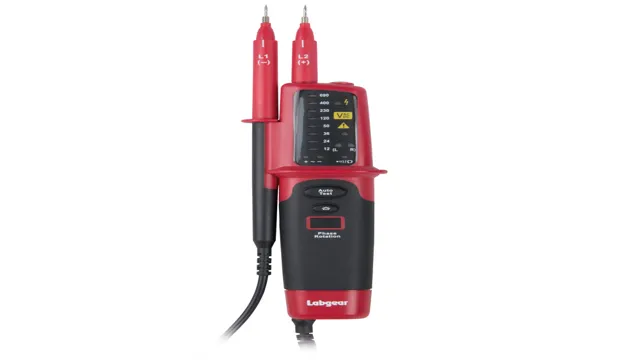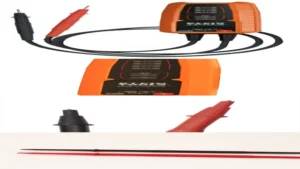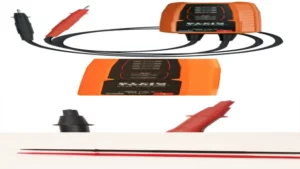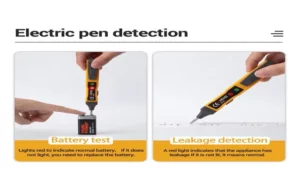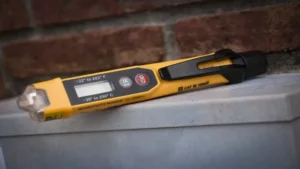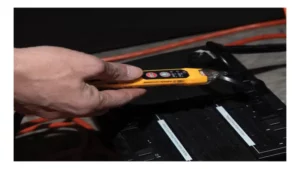A voltage tester plays a crucial role in ensuring electrical safety and preventing accidents or even potentially fatal incidents. However, with so many types of voltage testers available in the market today, it can be overwhelming to choose the right one. From simple contact testers to more sophisticated non-contact testers, the choice can be confusing.
Do you need a tester that can detect low voltage or high voltage? How about one that can measure both AC and DC voltages? Don’t fret; we are here to help! In this blog, we’ll give you insights into what you need to consider when selecting the perfect voltage tester for your needs. We’ll also provide tips on the features to look for and what to avoid. So whether you’re a professional electrician or a DIY enthusiast, read on and learn how to choose the right voltage tester like a pro!
Types of Voltage Testers
If you’re looking for a voltage tester to buy, it’s important to know the different types that are available. The most common types of voltage testers are non-contact testers, contact testers, and multimeters. Non-contact testers can detect voltage without physical contact with the wire or outlet, making them a safe option for beginners.
Contact testers require physical contact with the wire or outlet to detect voltage and are typically more accurate than non-contact testers. Multimeters can measure voltage, current, and resistance and are the most versatile type of tester. When deciding which voltage tester to buy, consider your level of experience and the specific tasks you will be performing.
If you’re new to electrical work, a non-contact tester may be the best option. However, if you need to measure multiple types of electrical readings, a multimeter would be the best choice.
Non-contact Voltage Testers
Non-contact voltage testers are incredibly useful tools for electricians and DIY enthusiasts alike. There are several types of voltage testers available on the market, each with its unique features. The first type of voltage tester is the non-contact voltage detector, also known as a voltage sensor.
This tester works by detecting the electric field around the wire or device without the need for physical contact, making it a safer option for detecting live wires. The detector emits a beep or a flashing light to alert the user of the presence of voltage, making it quick and easy to identify if a wire is live. The second type of voltage tester is the voltage meter, which measures the amount of voltage present in a circuit.
Unlike the non-contact voltage detector, voltage meters require physical contact with the wire or device to obtain a reading. These testers come in both analog and digital formats, with digital models being more accurate and easier to read. Lastly, there are combination voltage testers that incorporate both non-contact detection and voltage meter functions.
These testers are the most versatile option, capable of detecting and measuring voltage without requiring additional tools or equipment. Overall, non-contact voltage testers are an essential tool for any electrician or DIYer working with live wires. With the different types available on the market, it’s essential to choose the right tool for the job.
Remember to always follow safety procedures, such as turning off the power supply to the circuit before testing.
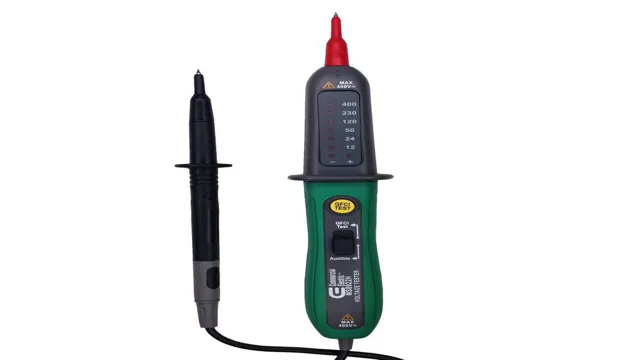
Contact Voltage Testers
One of the essential tools for anyone working with electrical systems is a voltage tester. These testers come in several types, each with its unique features suited for specific needs. Among them is the contact voltage tester, which is widely used to test the presence of voltage in electrical wires or conductors.
This type of tester is easy to use and can be held against a wire to detect the presence of live electricity, but it requires direct contact with the wire to work. Another type is the non-contact voltage tester, which works by detecting the energy field produced by electricity. It is an excellent choice for checking whether certain areas contain electricity or for locating a live wire within a bundle of wires.
Another type is the analog voltage tester, and it is a more traditional tool designed to measure voltage manually. To use it, you need to determine the voltage range you are testing to obtain accurate results. Ultimately, understanding the types of voltage testers and their various features is essential in selecting the one that best suits your needs.
Features to Consider
When it comes to choosing the right voltage tester, there are a few key features to keep in mind. First and foremost, it’s important to make sure the tester is capable of handling the voltage range you’ll be working with. Some testers are designed for household current, while others can handle industrial levels of electricity.
Additionally, it’s a good idea to look for testers with built-in safety features, such as audible alarms or automatic shut-off mechanisms. Other features to consider include display clarity, ease of use, and overall durability. Ultimately, the best voltage tester for your needs will depend on the specific tasks you’re performing, so it’s important to do your research and choose a product that meets your unique requirements.
So, which voltage tester to buy? It all depends on what you need it for.
Voltage Range
When it comes to choosing a voltage range for your electronic devices or systems, there are a few key features to consider. Firstly, it’s important to determine the specific voltage requirements for your device – this can be found in the manufacturer’s specifications or user manual. Once you have this information, you can then look for a voltage range that covers the required voltage, plus a little bit of wiggle room.
This ensures that your device will function optimally and won’t be damaged by over or under voltage. Another important factor to consider is the stability of the voltage range. If your device requires a constant, stable voltage, then you’ll want to choose a range with minimal fluctuations.
Lastly, it’s worth considering the overall quality and reliability of the voltage range you choose. Investing in a high-quality range will ensure that your device runs efficiently and lasts for as long as possible. By keeping these features in mind, you can find the perfect voltage range for your electronics.
Accuracy
Accuracy is a crucial factor to consider when choosing any technology-driven product, and AI-powered tools are no different. When we talk about accuracy in AI, we refer to how often the tool returns correct results. Features such as real-time dynamic learning, model retraining, and the quality of the data set used in training determine the accuracy of an AI tool.
The tool should also be able to analyze and provide interpretations for data from multiple sources and formats. Additionally, the AI tool needs to have a high degree of precision and robustness to maintain accuracy even when the data presents itself in unique formats or sources. Considering these features when evaluating AI tools will ensure that the results are reliable and valuable.
Safety Features
When looking for a car, there are many safety features to consider that can provide added protection for you and your passengers. One such feature is automated emergency braking, which uses sensors to detect obstacles or potential collisions and automatically applies the brakes to prevent or lessen the impact. Another important feature is lane departure warnings, which alerts drivers when they unintentionally drift out of their lane.
Blind-spot monitoring is also becoming increasingly popular, using sensors to detect vehicles in your blind spots and alerting you with a warning light or sound. Additionally, rearview cameras and parking sensors can help with visibility and prevent accidents while parking or backing up. It’s important to prioritize safety when choosing a vehicle, and these features are definitely worth considering.
Top Voltage Testers
Trying to figure out which voltage tester to buy can be confusing, especially if you’re not very familiar with electrical equipment. The first thing to consider is what kind of voltage you’ll be testing. Some testers are designed for low voltage systems while others can handle high voltage.
Another important factor is whether you need an analog or digital tester. Digital testers tend to be more accurate and easier to read, but analog testers are typically less expensive and may be more suitable for certain applications. Some popular voltage testers on the market include Fluke, Klein Tools, and Milwaukee.
Ultimately, the best voltage tester for you will depend on your specific needs and preferences, but these brands are a great place to start your search.
Fluke 1AC-A1-II VoltAlert Non-Contact Voltage Tester
When it comes to voltage testers, the Fluke 1AC-A1-II VoltAlert Non-Contact Voltage Tester is a top contender. This tester is incredibly easy to use and works by simply bringing it near to the electrical source being tested. The tip of the tester will light up and beep if there is voltage present, making it clear whether the area is safe or not.
This non-contact method is great for those who are new to electrical work and want to avoid accidents. Additionally, the tester is compact and can easily fit into a tool bag or pocket. Overall, the Fluke 1AC-A1-II VoltAlert Non-Contact Voltage Tester is a reliable and user-friendly option for anyone looking to test voltage quickly and safely.
Sperry Instruments STK001 Non-Contact Voltage Tester
Looking for the best voltage tester to make sure your electrical work is safe and reliable? Look no further than the Sperry Instruments STK001 Non-Contact Voltage Tester. With its innovative design and easy-to-use interface, this tester makes it simple to determine whether or not a current is active without ever making contact with the wires or electrical source itself. Thanks to its built-in sound and light alerts, you’ll never have to worry about missing a warning sign or misinterpreting a voltage reading.
Whether you’re a professional electrician or a DIY enthusiast looking to take on a new project, the Sperry Instruments tester is a must-have tool for keeping yourself and your home safe from electrical hazards. So why wait? Order your own Sperry Instruments voltage tester today and take the first step towards a safer, more reliable electrical system!
Conclusion
In the end, choosing the right voltage tester is all about finding the perfect match for your needs. Whether you’re a seasoned electrician or a DIY enthusiast, the key is to select a tool that you feel comfortable and confident using. So go ahead and test the waters – whether you opt for a non-contact voltage tester, a multimeter, or a simple two-pole tester, the right choice will ultimately spark joy and light up your life (in a safe and electrically sound manner, of course).
Happy testing!”
FAQs
What are the different types of voltage testers available in the market?
There are various types of voltage testers available in the market such as non-contact voltage testers, contact voltage testers, proximity voltage testers, and digital voltage testers.
How does a non-contact voltage tester work?
A non-contact voltage tester works by detecting the presence of an electric field around the object or wire being tested. It can detect AC voltage even from a distance and without having to make contact.
What is the difference between a contact and a non-contact voltage tester?
A contact voltage tester needs to make physical contact with the object or wire to test the voltage, whereas a non-contact voltage tester can detect the presence of voltage from a distance without the need for physical contact.
Can a voltage tester be used to check the voltage of DC circuits?
Most voltage testers are designed to detect AC voltage only, so they may not be suitable for checking the voltage of DC circuits. However, there are some voltage testers that can detect both AC and DC voltage.
What features should I look for when buying a voltage tester?
When buying a voltage tester, look for features such as accuracy, ease of use, safety features, range of voltage detection, and durability. It’s also important to choose a voltage tester that meets safety standards and is suitable for the type of work you’ll be doing.
Can I use a voltage tester to check the voltage of live wires?
Yes, but only if the voltage tester you’re using is designed to be used for live wires and has safety features such as insulated probes, voltage detection indicator, and audible and visual alerts.
What is the price range of voltage testers?
The price range of voltage testers can vary greatly depending on the type, brand, and features. A basic non-contact voltage tester can cost as little as $10, while a high-end digital voltage tester can cost upwards of $500. It’s important to choose a voltage tester that meets your needs and budget.
